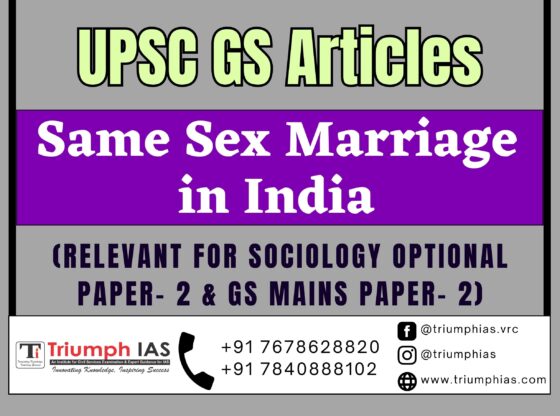Same Sex Marriage in India
Relevant for sociology optional Paper- 2 & GS Mains Paper- 2

Same-sex marriage is a contentious issue in India, where society remains deeply conservative on issues related to sexuality and gender. While homosexuality was decriminalized in India in 2018, the legal recognition of same-sex unions remains a distant prospect. In this essay, we will explore the legal and social context of same-sex marriage in India, and examine the prospects for change in the near future.
To begin with, it is important to understand the legal framework governing marriage in India. The Hindu Marriage Act, 1955, the Special Marriage Act, 1954, and the Muslim Personal Law are the three primary laws governing marriage in India. Under these laws, marriage is defined as a union between a man and a woman, and same-sex marriage is explicitly prohibited. The Indian Constitution also does not recognize same-sex marriage, as it is based on the traditional view of marriage as a union between a man and a woman.
However, recent years have seen some progress towards legal recognition of same-sex relationships. In 2018, the Supreme Court of India decriminalized homosexuality by striking down Section 377 of the Indian Penal Code, which criminalized consensual homosexual acts. The landmark judgment in Navtej Singh Johar v. Union of India recognized the right to equality and non-discrimination on the basis of sexual orientation, and paved the way for legal recognition of same-sex relationships.
Despite this progressive judgment, same-sex marriage remains a distant prospect in India. There are no laws explicitly recognizing same-sex unions, and same-sex couples do not have access to the legal benefits and protections that come with marriage. This includes inheritance rights, property rights, social security benefits, and legal recognition of parenthood.
In addition to the legal obstacles, same-sex couples in India also face significant social stigma and discrimination. Homosexuality is still seen as taboo in many parts of India, and LGBTQ+ individuals often face violence, harassment, and discrimination in their daily lives. This makes it difficult for same-sex couples to come out and openly declare their relationships, let alone demand legal recognition of their unions.
However, there are signs of change and progress towards recognizing same-sex relationships in India. In 2020, a group of LGBTQ+ activists and allies filed a petition in the Delhi High Court seeking legal recognition of same-sex marriage under the Hindu Marriage Act, 1955. The petition argued that the definition of marriage under the Act is not gender-specific, and therefore same-sex couples should be allowed to marry under its provisions. The case is currently pending before the court, and could have far-reaching implications for the legal recognition of same-sex unions in India.
In addition to legal challenges, there are also efforts to promote social acceptance of same-sex relationships in India. LGBTQ+ activists and allies are working to raise awareness and challenge stereotypes about homosexuality and gender identity, through campaigns, workshops, and other initiatives. There is also growing visibility of LGBTQ+ individuals in mainstream media, with movies, TV shows, and other forms of entertainment portraying same-sex relationships in a positive light.
It is important to note that the struggle for legal recognition of same-sex relationships in India is part of a larger global movement for LGBTQ+ rights. Many countries around the world have already legalized same-sex marriage, including neighbouring Nepal and Sri Lanka. India’s failure to recognize same-sex relationships not only violates the rights of LGBTQ+ individuals but also puts it at odds with international human rights standards.
In conclusion, same-sex marriage remains a contentious issue in India, where legal and social barriers continue to prevent recognition of same-sex unions. However, there are signs of progress towards legal recognition, with the decriminalization of homosexuality in 2018 and the ongoing case before the Delhi High Court seeking legal recognition of same-sex marriage under the Hindu Marriage Act, 1955. There is also growing awareness and acceptance of LGBTQ+ individuals in Indian society, with activists and allies working to challenge stereotypes and promote social acceptance. While there is still a long way to go, the movement towards legal recognition of same-sex relationships in India is gaining momentum, and there is hope that India will join the global trend towards recognizing the rights of LGBTQ+ individuals to marry and form families.
For more such free UPSC notes, Articles, News & Views Join our Telegram Channel. https://t.me/triumphias
Click the link below to see the details about the UPSC – Civils courses offered by Triumph IAS. https://triumphias.com/pages-all-courses.php


